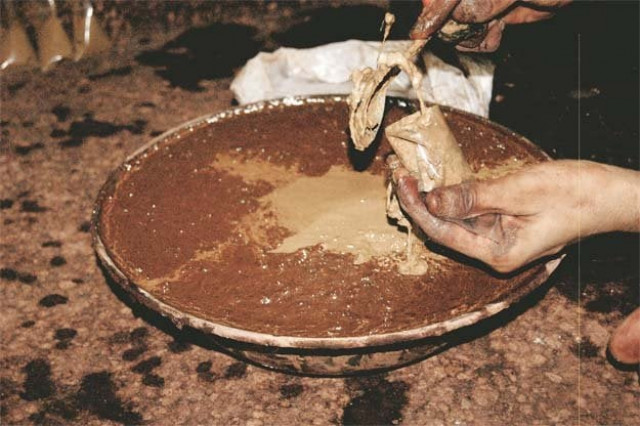‘Strong will only way out of paan, gutka addiction’
Karachi tops the list of gutka consumers in the country

Karachi tops the list of gutka consumers in the country. PHOTO: ARIF SOOMRO
In a first-of-its-kind study, the doctors wanted to find out ways to help people from South Asia quit tobacco, which they consume in a variety of ways. The study evaluated the feasibility of these methods for both Pakistan and United Kingdom.
Gutka: Chew on this
There are two ways to quit the habit, said AKU professor of medicine, Dr Javaid Khan, who is also the chairperson of the National Alliance for Tobacco Control. Firstly, cut down on whatever you are addicted to, he said. Secondly, decide for sure that you will not chew gutka from today or tomorrow, he added.
The basic objective of the study was to see how behavioural changes among users can lead to its cessation. The study revealed that the habit of chewing gutka is mostly taken up at a young age. Peer pressure, family acceptance, medicinal use (for dental pain), easy access, low price, lack of regulation, and media promotions all contribute to its widespread use.
A total of 32 people in Pakistan and the United Kingdom participated in the survey. The researchers conducted 23 activities, which included raising awareness about the harms of using smokeless tobacco and the benefits of quitting it, boosting clients’ motivation and self-efficacy, and developing strategies to manage their triggers, withdrawal symptoms and a relapse that may occur.
What is smokeless tobacco?
Smokeless tobacco is a product containing tobacco, placed in the mouth or nose but not burned at the time of use. A variety of unprocessed (sun-dried), processed or manufactured products are chewed, sucked or applied to gums and teeth. In Pakistan, 16.3% males and 2.4% females consume these varieties on a regular basis.
The more common forms of smokeless tobacco used by the people in Sindh are chhalia (betel nut) and gutka, said AKU associate professor of medicine, Dr Muhammad Irfan. “Chhalia is an addiction, too,” he pointed out. “It has been established that most of the locally consumed chhalia are of low quality and are often found with fungal infections. They contain artificial colour, artificial sugar, addictive substances and chemicals.” Since they are sold so cheap, the manufacturers use low quality ingredients, he said, adding that prolonged consumption of these products can lead to oral cancer.
Pakistan spends: Rs4 a year on each addict, says ANF
Gutka is a more powerful addiction than cigarette, said Dr Khan, adding that it is toxic. Those who chew gutka suffer from mouth cancer and 90% of them die, he said.
Karachi tops consumption
Based on the findings, Karachi tops the list of gutka consumption in the country. “The consumption of gutka is very much prevalent in Sindh while the use of paan and chhalia is more common among those people who migrated from India,” said Dr Khan. “The habit originally came from India. Oral tobacco use was common among those who migrated from there and it is still the case.”
Preventive action
According to Dr Irfan, consumption of these products may be curtailed if their prices go up. There has been a massive decline in the use of cigarettes across the world since the prices were increased and smoking was banned at public places, he added. “We need to change people’s behaviour as [right now] it is socially acceptable to chew paan and gutka.”
Dr Khan said that there is a dire need to create awareness among the public about the use of these products. Setting up tobacco cessation centres will be our next step, he added.
“Smokeless tobacco is a serious public health issue and needs to be addressed,” said Dr Khan. “Media should play a role in creating awareness among the public while the government should take steps to ban its sale.” All cigarette packets have a pictorial warning on them while smokeless tobacco is wrapped in plain pieces of papers when sold, he said.
Published in The Express Tribune, June 20th, 2016.



















COMMENTS
Comments are moderated and generally will be posted if they are on-topic and not abusive.
For more information, please see our Comments FAQ